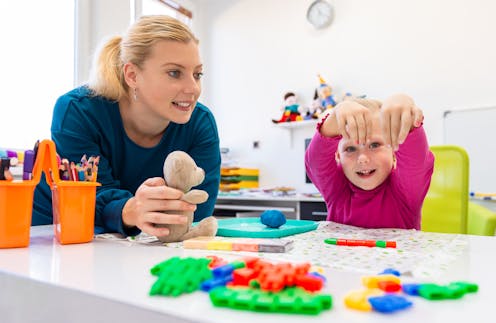What are executive function delays? Research shows they’re similar in ADHD and autism
- Written by Adam Guastella, Professor and Clinical Psychologist, Michael Crouch Chair in Child and Youth Mental Health, University of Sydney

Neurodevelopmental conditions such as attention deficit hyperactivity disorder (ADHD) and autism affect about one in ten children. These conditions impact learning, behaviour and development.
Executive function delays are core to challenges people with neurodevelopmental conditions experience. This includes skills such as paying attention, switching attention, controlling impulses, planning, organising and problem-solving.
These skills are important for learning and long-term development. They have been linked with future occupational, social, academic and mental health outcomes. Children with improved executive function skills and supports for these skills do better long term.
Decades of studies have described how difficulties in attention and impulse control underpin ADHD. Meanwhile, difficulties with switching attention and flexibility of thinking have been proposed to underpin autism.
As a result, different supports and interventions developed for different neurodevelopmental conditions target these skills. It sets up a system where a diagnosis is made first, then a set of supports is provided based on that diagnosis.
But our recent study, published in Nature Human Behaviour, shows executive function problems are similar across all neurodevelopmental conditions. Understanding these common needs could lead to better access to supports before waiting for a specific diagnosis.
Our study found more similarities than differences
We looked at 180 studies, over 45 years, that compared executive function skills across two or more neurodevelopmental conditions.
We brought the research together for all neurodevelopmental conditions that have been defined by diagnostic manuals, including ADHD, Tourette’s syndrome, communication disorders and intellectual disabilities.
Surprisingly, we found most neurodevelopmental conditions showed very similar delays in their executive skills.
Children with ADHD showed difficulties with attention and impulse control, for example, but so did children with autism, communication and specific learning conditions.
There were very few differences between each neurodevelopmental condition and the type of executive function delay.
This suggests executive function delay is best considered as a common difficulty for all children with neurodevelopmental conditions. All of these children could benefit from similar supports to improve executive skills.
But supports have become siloed
For decades, research has failed to integrate findings across conditions. This has led to siloed research and practices across the education, health and disability sectors.
Our data showed a gradual shift in the type of conditions that have been studied since 1980. In the earlier days, as a percentage, there were a far greater proportion of studies conducted on tic disorders, such as Tourette’s syndrome. In the past ten years, autism has been of greater focus.
This means research and practice is also siloed, based on the focus on funding and interest in the community. Some groups miss out from good science and practice when they become less visible in the political landscape.
This has led to a skewed support system where only children with a specific diagnosis can be offered certain interventions. It also reduces access to supports if families can’t access diagnostic services, which can be particularly difficult in regional and rural communities.
Due to these diagnosis-driven research practices, there are now assessment services, guidelines and treatments that are recommended for autism. These are usually independent from and not offered to children with ADHD, Tourette’s syndrome, communication disorders or intellectual disabilities despite a significant overlap in children’s needs.
How does this affect access to support
Families often find it hard to get the help they need. They often describe the assessment and support process as confusing, with long wait times and lots of barriers.
We have previously shown caregivers often attend assessment and support services with a broad range of needs, but leave with many needs unaddressed.
Recent national child mental health, autism and ADHD guidelines call for more integrated supports for children. But most services are not well set up to do this. It will take time to drive such system change if this is to be achieved.
Why we need integrated research
More integrated research will lead to more cohesive support systems across education, health and disability for all children in need.
Studies show, for example, that many risk factors (genetic and environmental) are common to all neurodevelopmental conditions. These include a broad overlap of risk genes that are the same between conditions, and common environmental factors that influence development in the womb, such as the use of certain drugs, stress and a significant immune response.
Other studies show how most children diagnosed with one neurodevelopmental condition will also be diagnosed with others.
But gaps remain. While we know certain stimulant medications can work well for ADHD, for example, we have less information about how they might help children with other neurodevelopmental conditions who have attention difficulties.
Unlike our knowledge about social supports for children with autism, we don’t have much research on how we can help children with ADHD with their social needs.
We should take a wider view of children’s needs
It’s important for families to be aware that if their child meets criteria for one neurodevelopmental condition, it is very likely that they will meet criteria for other neurodvelopmental conditions. They will likely have many needs relevant to other conditions.
It is worth asking clinical services about broader needs beyond a diagnosis. This should include developmental, mental and physical health needs.
It is also important to consider that many common interventions may have potential to support all children with neurodevelopmental conditions.
This is an important issue for government. Reviews are under way for supporting the needs of people with autism, intellectual disability and ADHD.
It’s time to establish more integrated systems, supports and strategies for all people with neurodevelopmental conditions for their home, school, play and work.
Authors: Adam Guastella, Professor and Clinical Psychologist, Michael Crouch Chair in Child and Youth Mental Health, University of Sydney


















